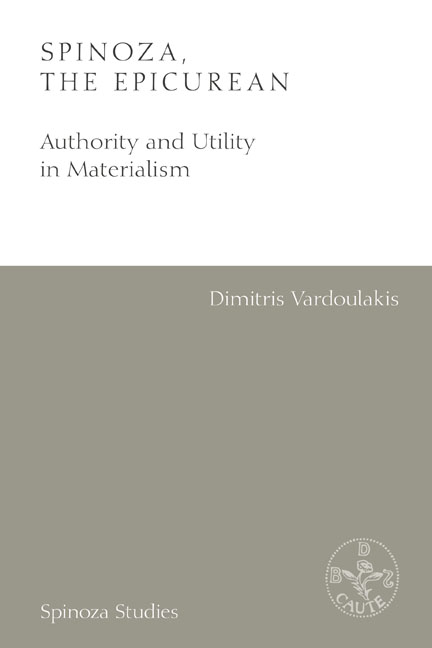Book contents
- Frontmatter
- Contents
- Reference Guide to Spinoza’s Work
- Acknowledgements
- Dedication
- Preamble
- Introduction: Why is Spinoza an Epicurean?
- 1 Freedom as Overcoming the Fear of Death: The Dialectic of Authority and Utility in the Preface
- 2 The Power of Error: Moses, the Prophets and the People (chapters 1, 2 and 3)
- 3 Philonomianism: Law and the Origin of Finitude (chapter 4)
- 4 Political Monism: The Primacy of Utility over Authority (chapters 5 and 6)
- 5 Love your Friend as Yourself: The Neighbour and the Politics of Biblical Hermeneutics (chapters 7 to 13)
- 6 The Freedom to Philosophize: The Two Paths to Virtue (chapters 14 and 15)
- 7 Fear and Power: Natural Right and Authorization in Spinoza and Hobbes (chapter 16)
- 8 Theocracy: On the State of Authority (chapters 17 and 18)
- 9 The Authority to Abrogate: The Two Paths to Virtue and the Internal Enemy (chapters 19 and 20)
- Conclusion: The Limitation of Spinoza’s Epicureanism
- Bibliography
- Index
Introduction: Why is Spinoza an Epicurean?
Published online by Cambridge University Press: 20 October 2020
- Frontmatter
- Contents
- Reference Guide to Spinoza’s Work
- Acknowledgements
- Dedication
- Preamble
- Introduction: Why is Spinoza an Epicurean?
- 1 Freedom as Overcoming the Fear of Death: The Dialectic of Authority and Utility in the Preface
- 2 The Power of Error: Moses, the Prophets and the People (chapters 1, 2 and 3)
- 3 Philonomianism: Law and the Origin of Finitude (chapter 4)
- 4 Political Monism: The Primacy of Utility over Authority (chapters 5 and 6)
- 5 Love your Friend as Yourself: The Neighbour and the Politics of Biblical Hermeneutics (chapters 7 to 13)
- 6 The Freedom to Philosophize: The Two Paths to Virtue (chapters 14 and 15)
- 7 Fear and Power: Natural Right and Authorization in Spinoza and Hobbes (chapter 16)
- 8 Theocracy: On the State of Authority (chapters 17 and 18)
- 9 The Authority to Abrogate: The Two Paths to Virtue and the Internal Enemy (chapters 19 and 20)
- Conclusion: The Limitation of Spinoza’s Epicureanism
- Bibliography
- Index
Summary
Spinoza is pointedly silent about his philosophical allegiances. The only time he lets his guard down is in a letter to Boxel from September 1674 in which he positions himself in the epicurean camp (Ep. 56). Given this, it is surprising that in the multitude of Spinozas in the reception of his work an epicurean Spinoza is nowhere to be found – with a few exceptions that I discuss in the next section.
I argue that Spinoza is an epicurean because he stages a dialectic between authority and utility. I do not mean a dialectics in the Hegelian sense, since it is not teleological. By dialectic I mean that the two terms, authority and utility, are in conflict but in such a way as to contribute to each other's determination, whereby it is impossible to thoroughly separate them. Like an old couple, they cannot stand each other even though they cannot do without each other.
The dialectic of authority and utility, specifically, stages the following conflict: Authority requires obedience whereas the drive to calculate our utility presupposes that we make our own practical judgements. Thus, under certain conditions, when authority takes over and suspends our judgements, Spinoza is pointedly silent about his philosophical allegiances. The only time he lets his guard down is in a letter to Boxel from September 1674 in which he positions himself in the epicurean camp (Ep. 56). Given this, it is surprising that in the multitude of Spinozas in the reception of his work an epicurean Spinoza is nowhere to be found – with a few exceptions that I discuss in the next section.
I argue that Spinoza is an epicurean because he stages a dialectic between authority and utility. I do not mean a dialectics in the Hegelian sense, since it is not teleological. By dialectic I mean that the two terms, authority and utility, are in conflict but in such a way as to contribute to each other's determination, whereby it is impossible to thoroughly separate them. Like an old couple, they cannot stand each other even though they cannot do without each other.
- Type
- Chapter
- Information
- Spinoza, the EpicureanAuthority and Utility in Materialism, pp. 10 - 47Publisher: Edinburgh University PressPrint publication year: 2020



